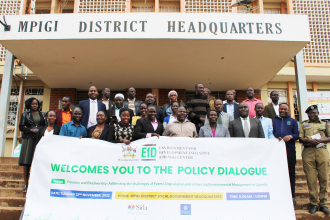
Uganda’s local governments want to decentralize governance of national forests
The Mpigi District Local Government and stakeholders in the forestry sector want environmental economists from Makerere University to conduct research on the impacts of decentralizing the governance…

Stan Metcalfe: On Knowledge and Economic Transformation
December 14, renowned economist Stan Metcalfe will hold a talk touching on today’s global challenges by reflecting two pioneering economists who changed the way we talk and think about innovation and…

Idea Call Winter 2022/2023 - Give your idea a chance to change the world!
Do you have an innovative idea or discovery that can potentially help others? Then, this idea call may be for you! GU Ventures is looking for researchers who want to join us in our mission to create a…

Better policies and regulations are needed to develop off-grid energy
There are several obstacles to developing off-grid energy in Eastern Africa. Those are, among others, according to a recent study by EfD Uganda, poor market information, lack of technical capacity…
Shocks derived from mining windfalls and horizontal transfers: Exploring the permanent income hypothesis in Chilean municipalities from a spatial competition approach
We explore how spatial interaction affects the strategic use of municipal income when deciding between 1) an optimal long-run expenditure strategy versus 2) using the current income to finance current activities, a phenomenon known as the permanent income hypothesis. Even when this hypothesis is grounded in temporal logic, insufficient attention has been given to the impact of spatial dependence on this type of budget decision. Therefore, we present two reasons why spatial interaction adds new insight to this discussion.

Tanzania takes action for clean cooking to save lives and fight climate change
Over 33,000 Tanzanians die annually from using firewood for cooking. Climate change, deforestation, and loss of biodiversity are other effects of the burning of firewood. The Tanzanian Ministry of…

Stakeholders joined EfD Nigeria to review Sea Fisheries Act
Regulatory agencies, fishing companies, and other stakeholders in Nigeria’s fisheries and aquaculture sector have decided to work towards making a revised version of the Nigerian Sea Fisheries Act of…
Incorporating Just Transitions in Kenya’s Low-Carbon Economy Development Path
Despite its low contribution to global greenhouse gas (GHG) emissions, Kenya bears a disproportionate burden of climate change impacts, which have been exacerbated by COVID-19. These impacts are disrupting the country’s economic performance, as seen in sectors such as agriculture, tourism, forestry, water, and transport. In many cases, the catastrophic effects of climate change are most disruptive to vulnerable groups, such as the poor, women, and children.

Strengthened collaboration between EfD Colombia, EfD India, and the WinEED collaborative
EfD Colombia and WinEED, hosted at the Department of Economics at Los Andes University in Bogotá, received the visit of EfD India's young researcher Nikita Sangwan in October. One purpose was to…